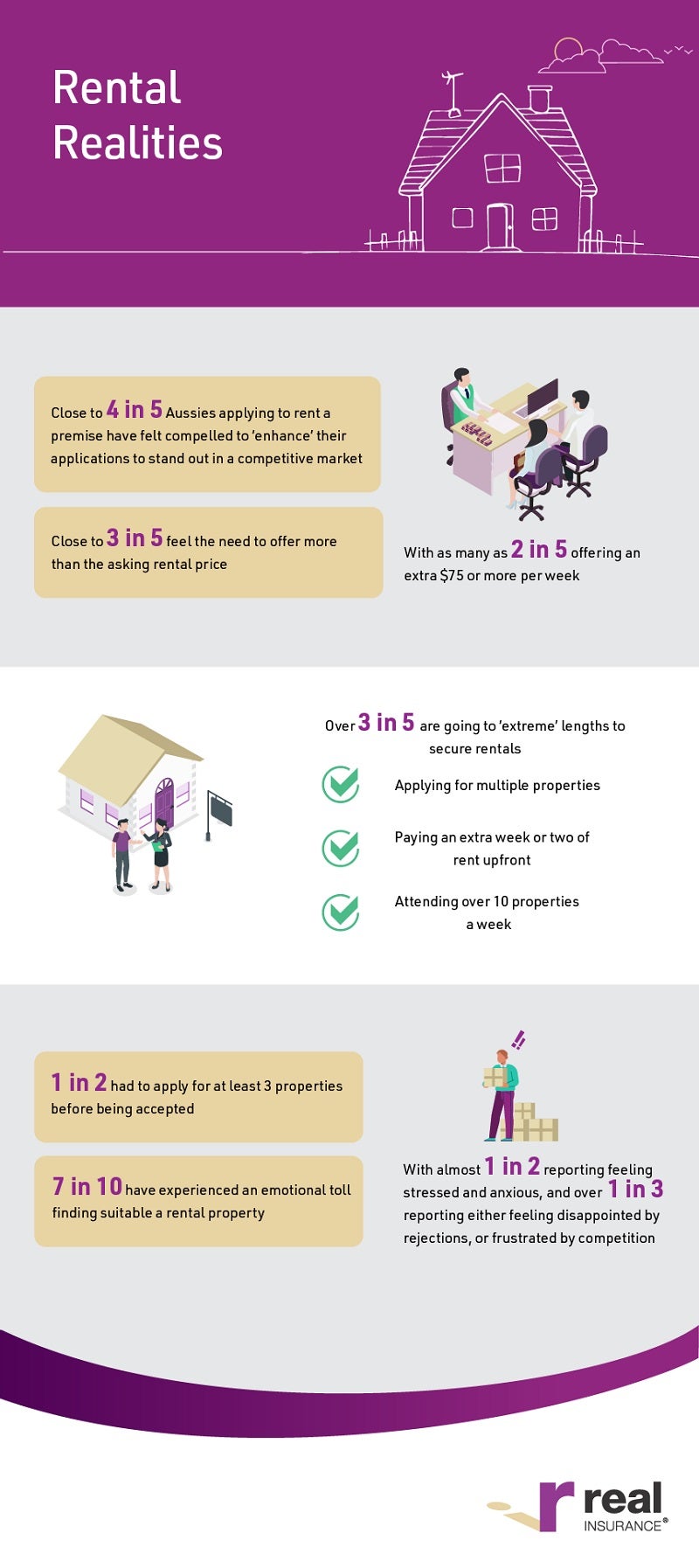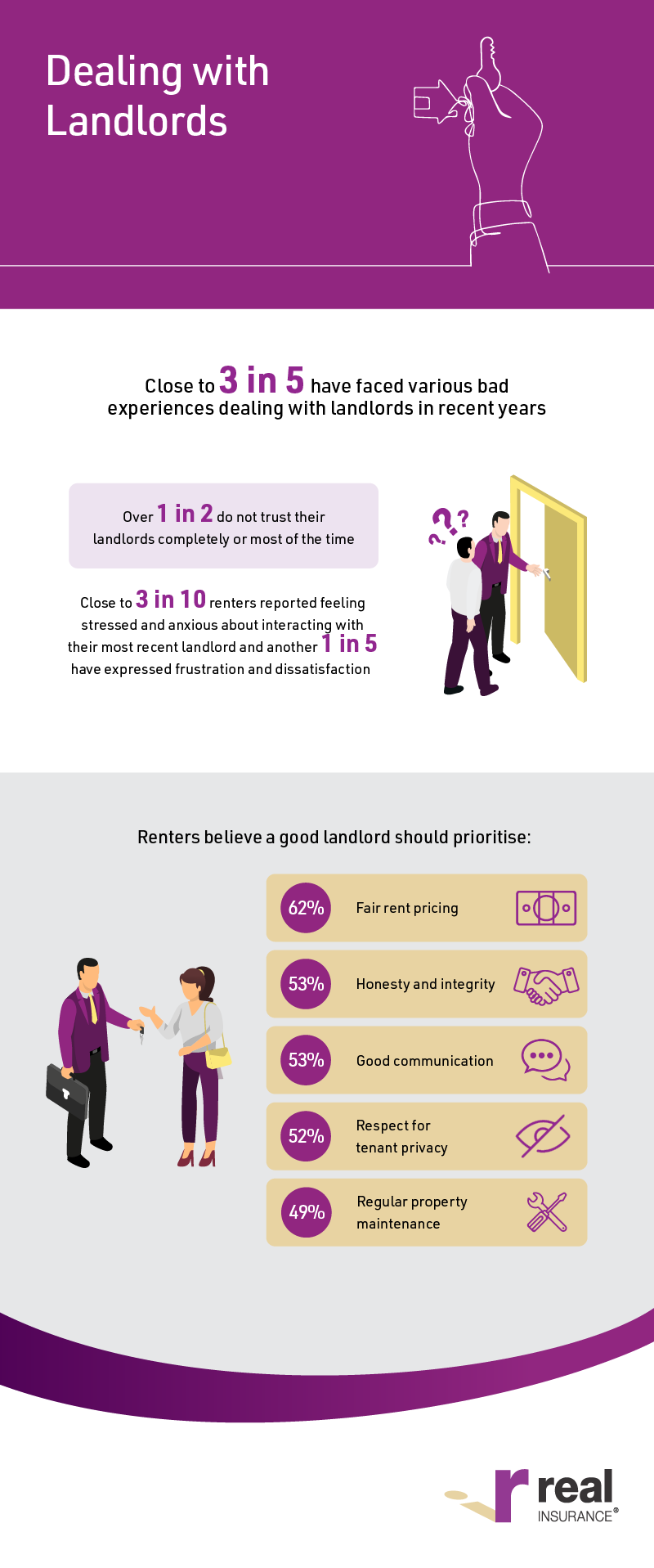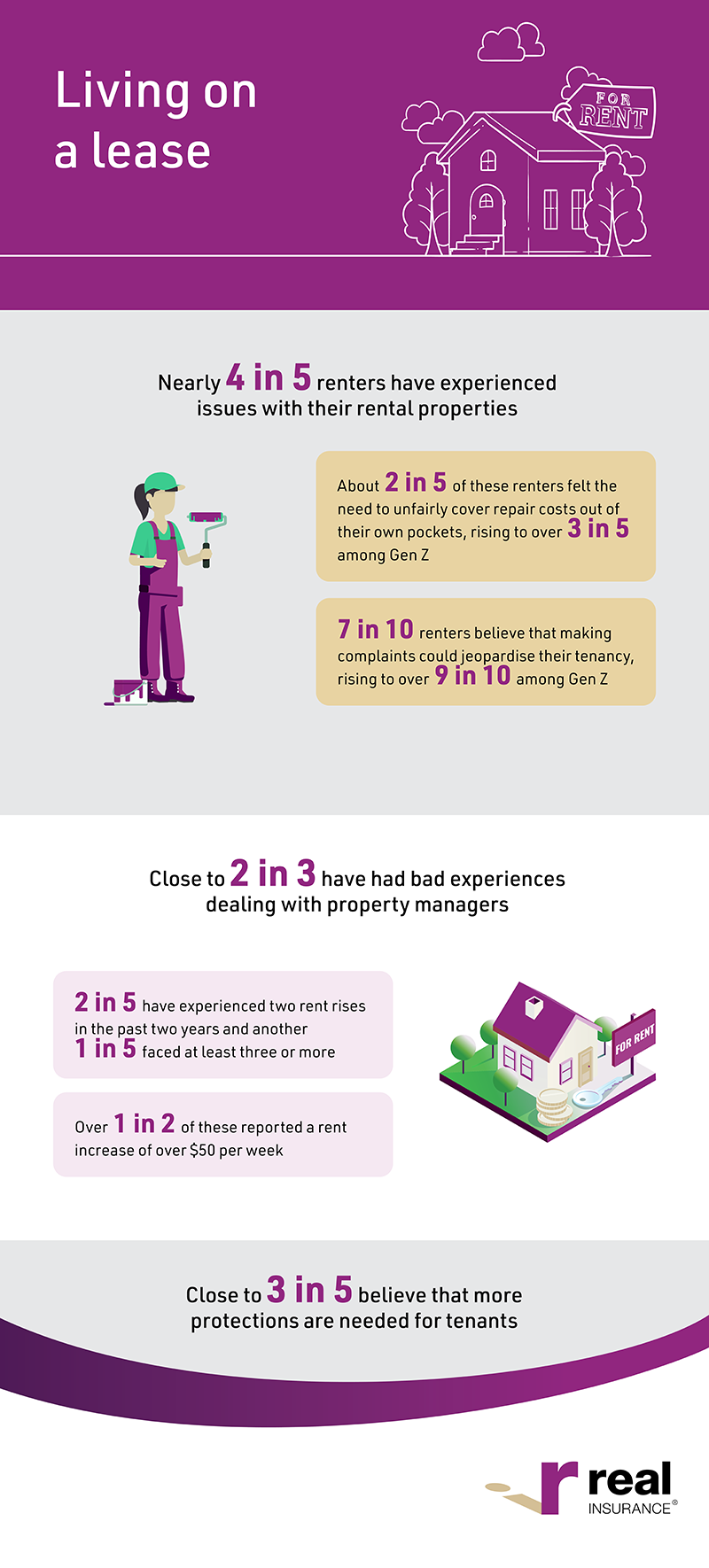The Real Property Report 2025
14 Feb 2025
- Almost 4 in 5 (77%) of rental applicants feel compelled to make their applications stand out in today’s competitive market, and more than half (57%) feel pressured to offer above the asking price.
- 3 in 5 (60%) Aussie buyers report encountering unexpected property issues post-purchase, despite conducting inspections.
- Almost half (48%) of renters who experienced rent increases have seen a reduction in their savings, while another 2 in 5 (45%) reported increased financial stress.
The great Australian dream of owning a home, maybe even a holiday home as well, feels distant for many of us. As Australia’s property market has been anything but predictable over the past two years, house prices continue to fluctuate, rental competition feels like it’s at an all-time high, and economic conditions tighten, both renters and buyers are feeling the pressure.
The Real Property Report 2025 found that the majority of Aussie renters (70%) have experienced an emotional toll during renting process, with almost half (49%) revealing they have felt stressed or anxious. Unfortunately, buyers were in a similar position, with 2 in 5 (40%) feeling stressed or anxious during the buying process. Conversely, only 3 in 10 (31%) felt excited and hopeful throughout the experience.

The state of renting in Australia
Renting and battling in a hyper-competitive housing market
Securing a rental property in today’s market has become a challenging, often overwhelming task. Nearly 4 in 5 (77%) rental applicants felt they had to make their applications stand out just to be considered. From providing detailed rental histories and landlord references, to offering more than the advertised rent; Australians are pulling out all the stops to secure housing.
In fact, close to 3 in 5 (57%) renters reported feeling pressured to offer above the asking rent price, with many offering up to $124 more per week – adding up to an extra $6,448 per year. For many Aussies, the average time spent searching for a property, is around eight hours a week, with 1 in 2 renters (50%) needing to attend at least four property inspections before finding a suitable home.
Joel Dignam, Executive Director of tenant advocacy organisation Better Renting commented: “For anyone out there looking for a property, my advice would be to just make sure you’ve got all your paperwork and documentation ready to go so you can apply quickly and easily. It can also help to try to get more creative with your search, thinking about places like Facebook Marketplace or Gumtree where you might be able to engage with a landlord directly and bypass a real estate agent. Although private landlords can be the worst, we also hear from lots of renters who find it a welcome change from dealing with a property manager.”
The pet’s and renting dilemma
For renters who own pets, the situation is even more challenging. Nearly 1 in 4 (25%) renters admitted to considering getting a pet without notifying their landlord, and many pet owners have faced difficulties securing leases due to their pets. The search for a property can be strenuous, as renters with pets often find themselves spending over nine hours a week searching for rentals that accommodate their needs.
The financial toll on renters
The Real Property Report 2025 also highlights the financial and emotional burdens renters face. As rent increases become more frequent, renters are forced to make difficult financial decisions. For many, these decisions involve reducing spending on non-essentials, delaying major purchases, and dipping into savings. This increased financial pressure is coupled with the stress of dealing with property managers and landlords, particularly for Gen Z renters, who report the highest levels of dissatisfaction with property management.
In fact, when applying for a rental property, 68% of applicants surveyed have been discouraged by their experiences with the leasing agent, highlighting the impact they can have on renters and the application process.
Joel Dignam commented: “The rental market is tight at the moment, and that can leave renters feeling pretty stuck. But you do have legal rights and it is worth knowing them. If you get a rent increase or a termination notice, it’s often worth checking in with your local tenant union or advice service, or just reviewing their online factsheets and resources. It won’t always solve the problem, but at least you’ll know better where you stand. Whatever you do, do not trust your agent as an accurate source of rental information.”

Rental stress and anxiety - The emotional cost of renting
The intense competition in the rental market isn’t just a financial burden – it’s an emotional one. The pressure to compete, coupled with negative experiences such as poor communication with leasing agents and misleading property descriptions, has left many Aussies feeling disillusioned with the rental process.
In fact, 3 in 5 (60%) renters have reported bad experiences with leasing agents, ranging from poor communication to unexpected rent hikes. Delayed repairs and maintenance have also been significant pain points, with 40 per cent of renters feeling compelled to cover repair costs out of their own pockets.
Adding to the stress, almost 2 in 5 (39%) renters have experienced two or more rent increases in the past two years. As a result, nearly half (48%) are saving less, and a similar proportion (45%) reported increased financial stress. This financial strain has led many renters to compromise on quality of life, cutting back on entertainment, leisure activities, and even delaying major purchases.
Joel Dignam commented: “You can’t separate the financial toll of renting from the emotional toll. When you are counting every dollar just to put petrol in the car, put food on the table, and keep a roof over your head, it’s incredibly stressful – and the longer this stress goes on, the worse it is. And then having to go out and apply for rentals, not knowing where you’ll be living in a month’s time, is even more scary. For renters on a low income it ends up being a huge drain on their resources and undermines their mental health.”

Buying a property in Australia
The complex and costly process of buying a property
The property-buying process has its own set of challenges, with buyers facing unexpected obstacles even after closing the deal. The research found that 3 in 5 (60%) buyers encountered significant property issues post-purchase, despite conducting third-party inspections. Common complaints include structural damage, unexpected repair costs, and misleading property descriptions.
These issues often lead to emotional strain, with 2 in 5 (40%) buyers feeling stressed and anxious during the purchasing process. Real estate agents also play a role in this, with over 3 in 5 (66%) buyers feeling that agents had misled them about key details, including property damage and hidden costs. Many buyers report that auctions can compound stress, with close to 3 in 5 (59%) reporting feeling pressured to bid more than they were comfortable with, while nearly 4 in 5 (78%) suspect they have encountered a dummy bidder.
Despite these frustrations, many buyers remain optimistic, with 3 in 10 (31%) feeling excited about the prospect of owning their home. However, affordability remains a significant barrier. Nearly 1 in 2 buyers (51%) have compromised on their preferred location due to skyrocketing house prices, and many express concerns about future mortgage payments and long-term financial security.
Financial pressures for sellers and buyers
The financial toll of the property market extends beyond the buyers and renters. Sellers, too, are feeling the weight of the current housing climate. Over 2 in 5 (43%) sellers believe that real estate agent commissions are unfair, adding yet another layer of financial strain to an already costly process.
However, sellers who complete transactions often feel relieved once their property is sold (46%). In contrast, 1 in 3 (34%) report feeling significant stress throughout the process, while many feel overwhelmed (28%) or disappointed by the offers they received (20%). This stress is particularly acute when dealing with time wasting buyers and navigating the complexities of moving.
Gender disparities in housing experiences
The report also uncovers notable gender disparities in the housing market. Women, in particular, report higher levels of stress and anxiety when navigating the property market. These heightened emotional pressures are often tied to the dual burdens of managing family responsibilities and securing affordable housing. Women are more likely than men to feel guilt and stress throughout the property search and buying processes, reflecting the broader societal pressures they face.
The future of Australia’s property market
As Australia’s property market continues to evolve, the Real Property Report 2025 offers critical insights into the challenges and trends many face in the current landscape. As we navigate rental competition and deal with unexpected financial and emotional hurdles, many of us remain concerned about the affordability of housing in Australia. It’s clear that we are searching for greater transparency, tenant protections, and support for both buyers and renters in this complex market.

Joel Dignam
Executive Director of tenant advocacy organisation Better Renting
Joel Dignam is the founder and executive director of Better Renting, a tenant advocacy organisation. In 2022 he completed a Churchill Fellowship through the US and the UK, learning from tenant movement organisations.